Subscriber Benefit
As a subscriber you can listen to articles at work, in the car, or while you work out. Subscribe NowAs an attorney in a rural community, Mark Guenin sees up close the problems smaller Indiana cities face with attracting new attorneys and finding creative funding solutions to public health issues.
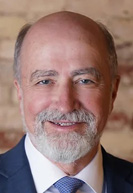
It’s why Guenin, a partner at Guenin Law P.C. in Wabash and president of the Wabash County Bar Association, is excited that several of the state’s judges, attorneys, mental health providers, state and county officials, and administrators will be converging on his city Oct. 13 for a daylong summit.
Guenin will deliver the opening remarks at the 2023 Summit for Rural Justice and Public Health Professionals, which will be held at Wabash’s Honeywell Center. The summit will feature 26 speakers, including Indiana Supreme Court Justice Christopher Goff, who serves as the chair of Indiana’s Justice Reinvestment Advisory Council.
“It’s impressive to me that they’re taking the time to do this,” Guenin said.
Planning on the summit started last summer, Guenin said. Attendees will include judicial officers, attorneys practicing both civil and criminal law, public health care professionals, local and county government members, and other justice and health care stakeholders.
Guenin said it’s been an interest of his to bring rural counties together for discussions about legal and public health issues facing their communities.
He said the summit will also provide continuing legal education opportunities.
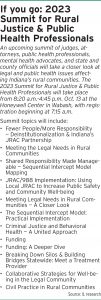 Attorney shortages in rural areas
Attorney shortages in rural areas
According to a news release from the Probation Officers Professional Association of Indiana, the summit will address the unique challenges of justice and health care professionals in rural communities — including scarce resources, red tape and isolation. Participants will learn about opportunities for collaboration, resources and strategies to meet the needs of rural professionals.
The dearth of attorneys in rural Indiana counties is an ongoing issue for the state’s legal community, and it will be one of the topics of discussion at the summit.
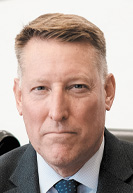
Christopher Lee, the Defense Trial Counsel of Indiana’s president and a partner at Dinsmore & Shohl LLP in Indianapolis, said the attorney shortage is one of the major problems in rural communities not only in Indiana, but also nationally.
Lee will speak on a summit panel looking at civil practice in rural communities.
As law has become more specialized, rural attorneys have to learn to practice in a variety of legal areas, Lee said.
“To be honest, I don’t know how they do it,” he said. “It’s pretty remarkable that they can.”
Some states are incentivizing attorneys to come into rural communities, Lee continued, pointing to South Dakota as an example. According to the State Bar of South Dakota, in 2013, the South Dakota Legislature approved the Recruitment Assistance Pilot Program to address the current and projected shortage of lawyers practicing in small communities and rural areas of the state.
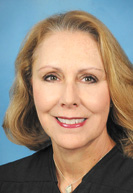
Likewise, Judge Melissa May of the Court of Appeals of Indiana noted there is a “legal desert” in a lot of rural Indiana counties due to lack of attorneys.
“We have quite the problem in the lack of lawyers available to help the people living there,” May — who will take part in a breakout session at the summit on meeting legal needs in rural communities — said.
The appellate judge said the state’s rural attorney shortage is getting more of a focus now. She surmised that there will be a multipronged approach to the issue involving the state’s law schools, the Indiana State Bar Association, local bar associations, the Indiana Supreme Court and local stakeholders.
She also pointed to organizations like Pro Bono Indiana and various legal aid societies, which she said have done a good job trying to offer legal assistance across the state and fill some of the gaps.
Still, May said, in some smaller communities, it’s become hard to find attorneys. It’s no longer a given that there will be multiple law offices visible in a drive through rural cities’ downtown areas or near county courthouses, she said.
Behavioral health issues impact smaller communities
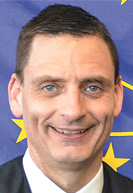
Judge Peter Foley of the Court of Appeals of Indiana will appear at the summit as part of a panel looking at the use of local JRACs to increase public safety and community well-being.
Foley’s breakout session will also include Court of Appeals Judge Dana Kenworthy, Brian Foley, the director of court services and chief probation officer in Morgan County, and William “Chris” Cunningham, the community corrections director in Grant County.
Local JRACs came into focus in 2021 with the passage of House Enrolled Act 1068, which created the local bodies.
In Morgan County — where Foley was judge before joining the COA last year — one of the programs established was a 90-day intensive residential drug-treatment program within the county jail.
That took cooperation between the sheriff, prosecutor’s office, county council and other entities, Foley said.
“When you’re around the table with those folks in a coequal setting, it just works a lot better,” he said.
Every community faces the challenge of where to find the money to fund local public safety and behavioral health programs, Foley continued. With a local JRAC in place, that at least gives communities a structure to try to address issues.

Bernice Corley, executive director of the Indiana Public Defender Council, will also be a speaker at one of the summit’s breakout sessions on the legal needs of rural communities.
Corley noted that there are unique challenges with the legal system in rural counties.
For example, a lot of those counties are losing population, she said, which results in a smaller tax base and less money to budget for new programs.
In addition to the session she’s moderating, Corley said she is interested in an afternoon summit session on criminal justice and behavioral health.
So many people in the legal system are dealing with behavioral health issues, Corley said, so the issue is probably at the forefront of everyone’s mind as they look for ways to best serve people with behavioral health issues.
“Every year, we’re trying to get it right,” she said.
Funding is elusive
Guenin, who has been practicing law for more than 40 years, said just about every rural county is struggling with what to do for people with real behavioral health problems.
“It’s truly expensive for the justice system to just put everybody in a prison or jail,” Guenin said. He added that problem-solving courts have proven to be one effective alternative.
Guenin said he hopes the summit will help rural communities identify resources and promote coordination to find funding for legal and behavioral health issues.
Northeast Indiana has worked really hard to find funding, he said.
“I think it can always be improved,” Guenin said of collaboration between counties.
David Bottorff, the Association of Indiana Counties’ executive director, said his organization’s focus is finding funding options and collaborative efforts for mental health and addiction issues as they relate to the justice system. He said collaboration between counties for grant funding is something that should be considered, especially for specialty courts.
The state announced in August it will distribute about $18 million in opioid settlement funds to support local law enforcement, drug task forces and treatment hubs. That is part of Indiana’s $507 million share of a $26 billion multistate agreement with three pharmaceutical distributors — Cardinal Health, McKesson, and AmerisourceBergen — and Johnson & Johnson, which manufactured and marketed the opioids.
Bottorff said that with the opioid settlement funds, individual counties may look at the funding and decide that it could be something that could help them jointly fund projects.•
Please enable JavaScript to view this content.
